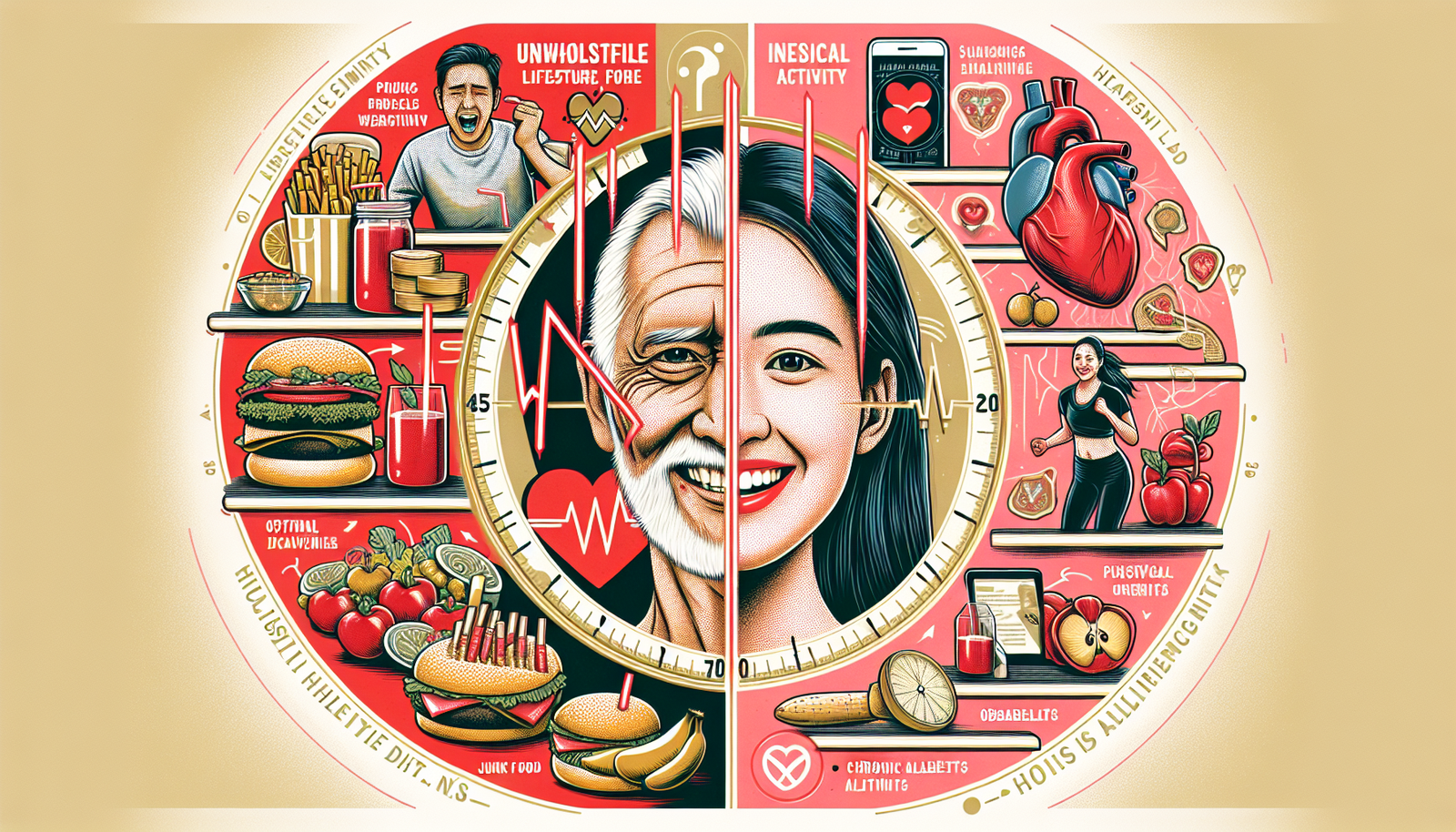
Healthy Living: Combatting Fast Heart Aging from Chronic Conditions
Understanding Heart Aging
The term “heart aging” refers to the physiological changes that occur in the heart as a person ages. These changes can negatively impact heart function, leading to a higher risk of cardiovascular diseases. Recent studies have shown that certain chronic conditions, coupled with unhealthy lifestyle choices, can accelerate this aging process. Understanding these factors can empower individuals to make healthier choices that contribute to better heart health over time.
The Role of Chronic Conditions
Various chronic conditions can significantly impact heart health, including:
- Obesity: Excess weight increases the strain on the heart, raises blood pressure, and affects cholesterol levels.
- Diabetes: High blood sugar levels can damage blood vessels and nerves that control the heart.
- Hypertension: Chronic high blood pressure forces the heart to work harder, potentially leading to heart disease.
- Chronic Kidney Disease: This condition can lead to an imbalance of electrolytes, which can adversely affect heart function.
- Chronic Inflammation: This can stem from various conditions and may also play a role in accelerating heart aging.
Each of these conditions contributes to a cycle of adverse effects on heart health, making it crucial for individuals to understand their personal risks and take proactive steps toward healthier living.
The Impact of Unhealthy Lifestyles
Unhealthy lifestyle choices can exacerbate chronic conditions and accelerate the aging of the heart. Key lifestyle factors that contribute to heart aging include:
Poor Diet
A diet high in saturated fats, sugars, and processed foods can lead to obesity and other chronic conditions. To combat this, consider adopting a heart-healthy diet:
- Incorporate plenty of fruits and vegetables.
- Opt for whole grains over refined grains.
- Choose lean proteins such as fish, chicken, and legumes.
- Limit saturated fats and avoid trans fats.
- Reduce sodium intake to lower blood pressure.
Lack of Physical Activity
Sedentary lifestyle is another factor that accelerates heart aging. Regular physical activity helps maintain a healthy weight, reduces stress, and improves circulation. To counteract the effects of a sedentary lifestyle:
- Aim for at least 150 minutes of moderate aerobic activity per week.
- Incorporate strength training exercises at least twice a week.
- Take short breaks to move around during long periods of sitting.
Smoking and Alcohol Consumption
Tobacco use and excessive alcohol consumption have profound detrimental effects on heart health. Smoking increases the risk of developing coronary artery disease, while high alcohol intake can lead to high blood pressure and irregular heartbeats. Here are tips to reduce or eliminate these habits:
- Seek support to quit smoking, such as counseling or nicotine replacement therapy.
- Follow guidelines on alcohol consumption: no more than one drink per day for women and two for men.
The Connection Between Mind and Heart
Mental health plays a significant role in heart aging. Chronic stress, depression, and anxiety can adversely affect cardiovascular health. It’s essential to incorporate strategies that promote mental wellness, such as:
Meditation and Mindfulness
Practicing mindfulness can help reduce stress and promote overall emotional well-being. Consider:
- Setting aside time each day for meditation or deep-breathing exercises.
- Engaging in activities that cultivate mindfulness, such as yoga or tai chi.
Social Support
Strong social connections and supportive relationships play a critical role in emotional health. To foster these connections:
- Engage in meaningful conversations with friends and family.
- Join community groups or activities that interest you.
Monitoring and Managing Health
Regular check-ups and monitoring of chronic conditions can significantly influence heart health. Discuss strategies with healthcare providers, including:
Routine Screenings
Routine screenings for blood pressure, cholesterol levels, and blood sugar can help identify risks before they escalate. Set reminders for annual check-ups and engage in:
- Regular blood tests as advised by your healthcare provider.
- Tracking health metrics at home, like blood pressure monitoring.
Adherence to Treatment Plans
For those with chronic conditions, following prescribed treatment plans is essential. Discuss potential lifestyle changes that could enhance the effectiveness of prescribed medications. Strategies include:
- Keeping a daily medication schedule.
- Reporting any side effects or concerns about medications to your healthcare provider.
Innovative Approaches to Better Heart Health
In addition to traditional methods, exploring innovative health practices can significantly impact heart aging. Consider these options:
Wearable Technology
Fitness trackers and health apps can help you monitor physical activity, heart rate, and overall health metrics. Using technology in your fitness journey can help you stay motivated and accountable.
Telehealth Services
Telehealth offers a convenient way to consult with healthcare professionals without needing to visit a clinic. This can be particularly useful for managing chronic conditions. Many services allow you to:
- Schedule virtual appointments for regular check-ups.
- Access nutritional and physical therapy consultations.
Starting Your Journey to a Healthier Heart
Making long-lasting changes to combat fast heart aging can seem overwhelming, but even small adjustments can lead to significant improvements over time. Begin by setting achievable goals. Here are unique starting points:
Set SMART Goals
When planning lifestyle changes, consider the SMART framework:
- Specific: Define what you want to achieve clearly.
- Measurable: Set criteria for tracking your progress.
- Achievable: Ensure goals are realistic.
- Relevant: Make sure goals are meaningful to you.
- Time-bound: Set a deadline for your goals.
Engage in New Activities
Explore different forms of physical activity to find what you enjoy. Consider joining local classes or groups focused on:
- Zumba or dance classes
- Hiking or walking clubs
- Swimming or cycling programs
Incorporating these activities not only improves physical health but also fosters social connections, ultimately supporting mental well-being.
Maintaining Overall Wellness
Remember that combating heart aging is a holistic endeavor that encompasses various aspects of health. Combining physical health, mental wellness, and lifestyle changes creates a multidimensional approach. By actively monitoring and managing chronic conditions, making healthier lifestyle choices, and incorporating innovative techniques, individuals can significantly reduce the risk of accelerated heart aging.
By prioritizing heart health today, we ensure a healthier future. Understanding the various risks associated with chronic conditions and lifestyle choices, and taking proactive measures to address them, can lead to a longer, healthier life characterized by vitality and well-being.

